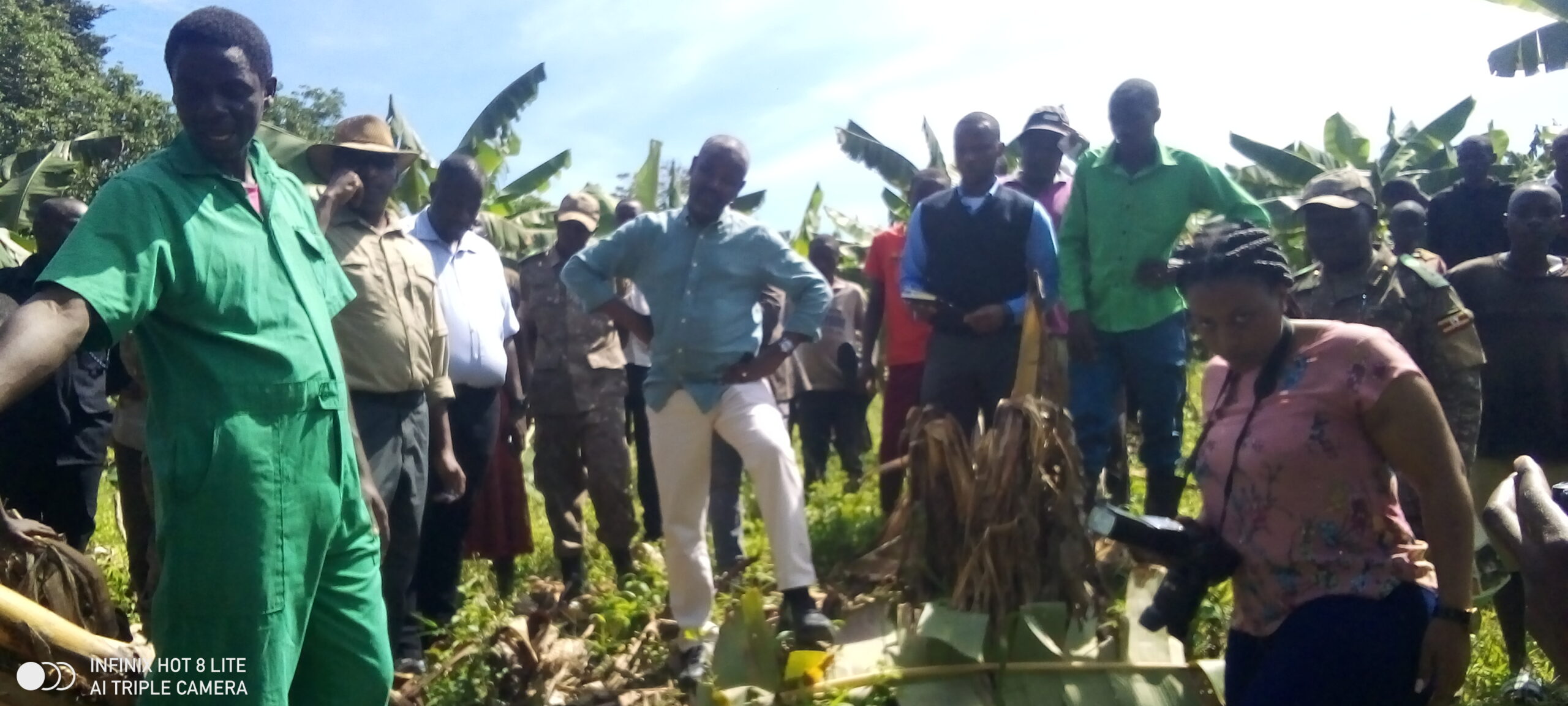MITOOMA – Surrounding crops fields with beehives attached to fence posts and strung together with wires serves as a humane and eco-friendly way to protect crops from elephants.
Accordingly, the Ministry of Tourism Wildlife and Antiquities and Uganda Wildlife Authority [UWA], think erecting the beehive fence along Queen Elizabeth National Park will stop serve the same purpose in Mitooma district.
The resolution was arrived at after 200 homesteads were invaded by over 100 elephants in the district mainly in the sub-counties of Kiyanga and Rwoburunga.
According to Benon Karyaija, Mitooma district LCV chairperson, the elephants have destroyed crops such as; jack fruits, pineapples, cassava, and banana plantations in the villages of Kaburara, Rutobo, Nyanga, Hongyi, Kakimba, Bukiro I & II, Kamabare.
He further said hyenas and leopards also kill goats, sheep, pigs and cows in the homesteads neighbouring the park leaving farmers counting losses.
While visiting farms to assess crops damaged by the stray elephants, George Owoyesigire from the Tourism Ministry, said a beehive fence would be erected along the boundary between Queen Elizabeth and Mitooma district as a temporary measure to prevent the escalating human-wildlife conflict.
“We have been implementing a number of interventions in different areas but given the landscape of Mitooma district, we have observed that the immediate intervention is establishing a beehive fence,” Owoyesigire said.
“Bees target the soft parts, they sting the elephants’ snout, ears, and eyes but they don’t kill the animals. This has worked very well in Kibale Forest National Park where we have over 1500 beehives but also research in other countries like Tanzania and Ranyuki in Kenya,” he said.
According to Owoyesigire, Kiyaga Sub-county requires 1000-2000 beehives are required to be attached to fence posts to deter the elephants from crossing from the game park into the neighbouring villages.
Owoyesigire said that the bees come with economic opportunities and incentives for the locals who he urged to embrace apiary as part of eco-tourism.
Charles Tumwesigye Baryamwisaki, a commissioner in charge of Tourism confirmed that the beehive project is a World Bank-funded project to end the human-wildlife conflict.
Other long term interventions to mitigate the wildlife conflict in Mitooma include; excavation of trenches, deployment of rangers, erecting of electric fence, community sensitization and putting alternative livelihood enterprises.
The Director of Conservation at UWA, John Makombo said they are set to start assessing the boundary along National Queen Elizabeth Park to identify the right mitigation measure to prevent future invasions.
“We shall start by assessing the magnitude of the affected area, procurement of beehives, training and equipping communities with skills because if you dump the beehives in the bush and you don’t pay attention to them, they will not colonise the area,” Makombo said.
However, locals blamed UWA officials for sharing revenue from the park with the district without consulting them, adding that district officials only bought 24 goats from Shs 16 million UWA gave them to support communities.
“We were told the money was spent to buy 24 goats at a cost of Shs 300,000. But the district officials could not account for the balance,” Fenekansi Mpirirwe lamented.
According to Bashir Hangi, the senior communications officer at UWA, the new law requires that money from shared revenue goes to the communities as a conditional grant for specific projects. “Projects have to be approved and UWA must be in agreement with the projects in implementation,” he said.
Richard Mugisha, LC III Chairperson Kiyanga Sub-county said compensating farmers who lose their crops to park animals has been a big challenge on the side of government.
Thomas Tayebwa, the Deputy Speaker of Parliament also expressed concern that the process to compensate farmers whose crops are destroyed by wild animals is tedious.
Tayebwa who hails from Mittoma district added: “Police officers, agricultural officers have turned the compensation process into opportunities. They demand money from the farmers to make scene reports. Others [farmers] are even forced to buy forms. Why can’t this system change to make the compensation process more convenient for our people?”
Meanwhile, studies show beehive fences have benefited farmers in several East African countries, and projects elsewhere have begun to test them as well, but several uncertainties, including their success at a scale that doesn’t just displace the elephants to the first unfenced farm, suggest they should still be used with other techniques as part of a toolkit to reduce human-elephant conflict.
https://thecooperator.news/kasese-farmers-count-losses-as-stray-elephants-invade-farms/
Buy your copy of thecooperator magazine from one of our country-wide vending points or an e-copy on emag.thecooperator.news
